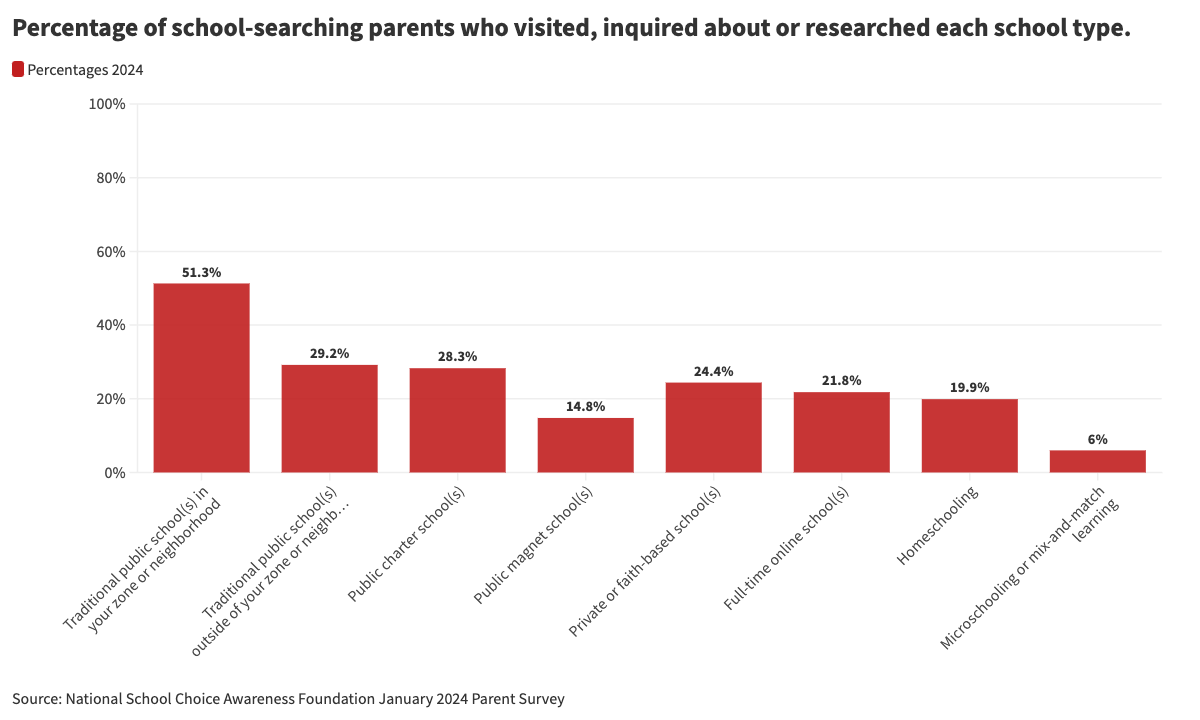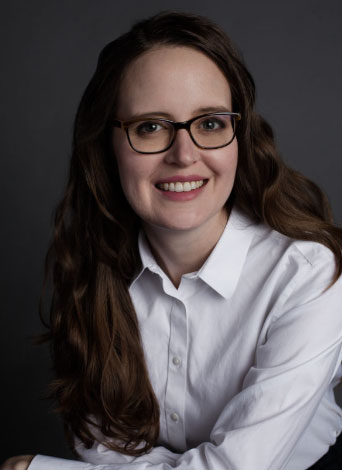Growing Number of Parents Looking to Change Kids’ Schools, New Survey Shows
As interest in school choice increases, traditional public schools remain a popular option among searching families.

Get stories like this delivered straight to your inbox. Sign up for The 74 Newsletter
Updated, Jan. 25
Parents are increasingly considering new schooling options for their kids, according to a survey released this month. After exploring available choices, a smaller number of families ultimately selected new schools but a majority reported wanting more information about school choice.
Both local and out-of-district traditional public schools remained popular among school-searching families, followed by charter schools, private and religious schools and homeschooling.
The results come from a survey that included 2,595 parents of school-aged children conducted by The National School Choice Awareness Foundation and the National School Choice Resource Center (Navigate), which run National School Choice Week.

They began administering this survey right after COVID hit to learn more about how the pandemic impacted parents’ views around school choice and to determine how to best support families as they navigated their options.
“The big takeaway here is families want options for their kids,” foundation CEO Andrew Campanella said. “They’re looking at their options, but the lens through which they view choice is significantly different than the way people involved in the policy world look at it.”
Overall, about three-quarters of parents surveyed said they’d at least “considered” new schools for a child last year— a 35% increase over 2022. Ultimately, 44% of parents selected a new school. Just under two-thirds reported wanting more information about their options.

The results were released to coincide with National School Choice Week, which began Sunday and will run through Jan. 27. They also come as public schools across the nation face enrollment declines of over 1 million students, according to an Associated Press analysis, which showed lasting disengagement from public schools.
The National School Choice Awareness Foundation defines school choice as empowering parents to select the schools and learning environments that best meet their children’s needs including traditional public schools, charter schools and private schools.
They do not identify as a policy advocacy organization and say they do not promote one schooling option over another. Campanella, the CEO, previously served in a senior-level position at the American Federation for Children, a school choice advocacy group founded by the DeVos family that heavily lobbies for directing taxpayer money toward private school options.
There are a number of reasons that parents are researching new schools, according to Inga Cotton, the founder and executive director of San Antonio Charter Moms, a non-profit advocacy group that supports parents and caregivers as they explore schooling options.

In San Antonio, for example, she hears from parents who are frustrated that their local public schools are not offering accelerated enough curriculum to prepare their kids for college. In other cases, families of color are grappling with the consequences of redlining and discrimination. In these areas in particular, it can be harder to access advanced coursework.
Cotton said she also supports families who have kids with disabilities whose schools might not have the resources necessary to support their needs. Finally, some families are looking for schools with values that align with their own, including progressive ideologies, classical education or religious-centered learning.
Other advocates point to a string of Republican states adopting or expanding tax credit scholarships, education savings accounts or vouchers, which they see as siphoning funds from public schools, coupled with a wave of partisan criticism of public schools and teachers fed by volatile conflicts over remote learning, mask mandates and classroom content.
The survey results note that “traditional public schools remain popular among school searching families” with just over half of parents considering new schools reporting that they visited, asked about or researched their local public schools. Just under 30% reported the same for public schools outside of their neighborhood. The numbers were slightly lower for charter schools (28%), private or faith-based schools (24%), homeschools (20%), and full-time online schools (22%).
“This almost fake conflict between district-managed schools and schools that are in the public sector but not managed by districts … is really just a function of a policy debate,” Campanella said. “And it’s not what families are experiencing when they go to make their choices.”
Yet broadening the school choice label to include more controversial items like vouchers, which let parents use taxpayer money to send their kids to private schools, is an intentional choice conservative advocacy organizations are making, according to Joshua Cowen, an education policy professor at Michigan State University.
He believes that while there’s strong bipartisan support for a number of school choice policies, “there’s real skepticism on the use of public funding for private education in the K-12 space,” outside of the conservative base he defined as “Trump dead-enders” or “long-standing anti-government types.”
The National School Choice Awareness Foundation asserted, though, that “school choice is far from partisan, at least when it comes to parents making choices.” The evidence: parents who identified as Democrats chose new schools for their children last year at higher rates than Republican parents (56% to 40%), according to its survey.
A 2022 poll from Education Next, an opinion and research journal based out of Harvard’s Kennedy School of Government, found strikingly different results. Support for the general concept of school choice was starkly partisan, according to their data, with 60% of Republicans and only 41% of Democrats expressing a favorable position.
This is a key example of how question phrasing can impact survey results. Particularly when surveys come from advocacy groups it is important to remain skeptical of data, not because they’re “cooking the books” but because questions can be leading, Cowen said.

“If you ask, ‘Do you support taxpayer dollars going to church-based schools?’ you’re going to get a very different number than if you say ‘Do you think parents should get to choose within a wide variety of educational options for their kid?’” he said. “Clearly, the second one is going to sound a lot better: you’re going to get more support. And if your goal as an organization is to show numbers with more support, that’s the way you do it.”
The National School Choice Awareness Foundation did not explicitly ask about vouchers in its survey, which was delivered to Survey Monkey’s National Audience panel between Jan. 2-4. Campanella said the survey was solely focused on types of schools rather than mechanisms used to access them, such as vouchers.
He noted they used the survey results to help inform the over 27,000 events the foundation supports across the country for National School Choice Week.
Disclosure: Walton Family Foundation and Stand Together Trust provides financial support to The National School Choice Awareness Foundation and The 74.
Get stories like these delivered straight to your inbox. Sign up for The 74 Newsletter

;)
